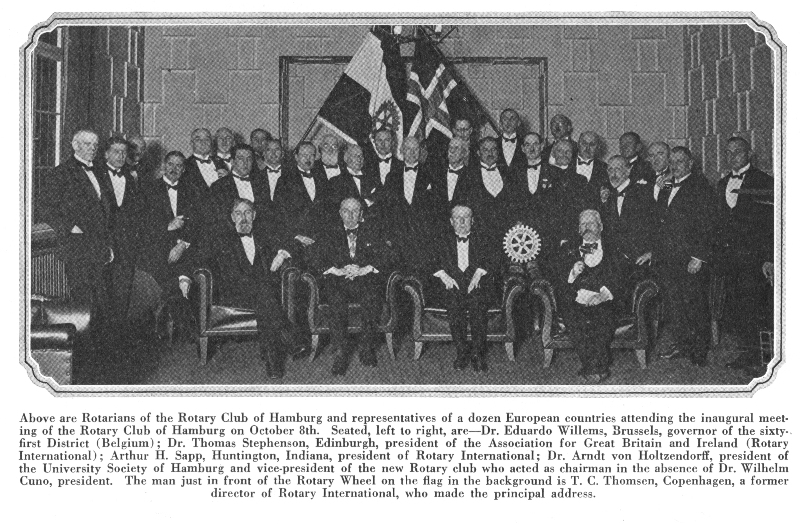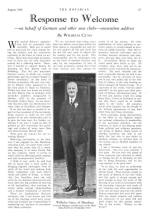|

The First Rotary Club in
Germany – Hamburg
The most important
events in the history of the 20th century in Germany
were the two lost world wars. Their negative consequences could
only be surmounted through the help of the United States. This
is true for the moderation of the terms of the Versailles treaty
through the Dawes and Young-plan and especially for the
outstanding help by the Marshall-plan after 1948, which was
essential for the West German economy miracle (Wirtschaftswunder)
of the fifties and the sixties.
In this context, great
importance must be attributed to the idea of Rotary. The
movement originated from the United States for the mutual
acquaintance of different classifications and the international
understanding of all countries with a democratic society. The
75th anniversary of the founding of the first Rotary Club in
Hamburg was therefore celebrated with due gratitude in October
2002. The Hamburg Rotarians were delighted, that their city was
the first to bridge the divide to the United States through
Rotary. In the next 18 month, this epochal initiative was
followed by Frankfurt, Cologne, Munich, Stuttgart, Dresden and
Berlin.
The city of Hamburg was
especially suited for this role as a pacemaker, because most of
the business contacts to oversea traditionally were initiated
from this biggest German haven. Though in 1918 Germany’s former
colonies were lost, it did not take long until successful
business relations were taken up again. Many trades people,
ship-owners and bankers were involved. Already in the summer of
1922 the Oversea-Club was founded, whose aim of international
understanding can be compared with Rotarian principles.
  It
is therefore hardly surprising, that the important persons, who
founded the Rotary Club of Hamburg, already had positions in the
Oversea-Club. The central figure at the beginning of Rotary in
Germany, however, was Wilhelm Cuno. As early as 1918 he
became general director of the important steamship line HAPAG.
In 1922 he was nominated Chancellor of the Reich, but had to
resign in 1923 because of a vote of no-confidence by the
socialist party. He returned to lead the HAPAG company again. At
the age of 51 he was elected as the first president of the
Hamburg club for a two year term from 1927 to 1929. He was also
the first German to speak at a Rotary world convention. (article
at left) In the year 1930 he became the first governor for the
by now 27 clubs in Austria and Germany. It
is therefore hardly surprising, that the important persons, who
founded the Rotary Club of Hamburg, already had positions in the
Oversea-Club. The central figure at the beginning of Rotary in
Germany, however, was Wilhelm Cuno. As early as 1918 he
became general director of the important steamship line HAPAG.
In 1922 he was nominated Chancellor of the Reich, but had to
resign in 1923 because of a vote of no-confidence by the
socialist party. He returned to lead the HAPAG company again. At
the age of 51 he was elected as the first president of the
Hamburg club for a two year term from 1927 to 1929. He was also
the first German to speak at a Rotary world convention. (article
at left) In the year 1930 he became the first governor for the
by now 27 clubs in Austria and Germany.
The number of members
increased from 33 at the foundation to 83 in 1931. Since 1932
the numbers decreased however because of the known political
circumstances in connection with the coming to power of the
National-Socialist Party (NSDAP). For the National Socialists an
international movement was suspicious, especially one led from
the United States. Therefore many career-orientated party
members and Jewish friends had a reason or were forced to leave
the club. When the German Rotary clubs dissolved voluntarily in
1937, the Hamburg club had only 39 members left. Nevertheless
these members were the central nucleus of a Rotarian circle of
friends during the years of war. In addition, they represented a
substantial number of members when the club was readmitted on
June, 7th, 1949. Today, the club has 98 members. Its
partner clubs are the oldest club in Austria, Vienna, the
Marseille club in France, also Hamburg’s twin city, and the
Dutch club of Rotterdam, which was very helpful in readmitting
the Hamburg club in 1949.
This article is
the translation of a part of an article “75 Years Rotary
Club Hamburg” published in the German magazine “Der
Rotarier” (now “Rotary Magazin”), in September, 2002,
written and compiled by Dr. Hellmut Kruse, member of the
Rotary Club of Hamburg.
|

